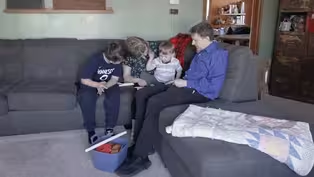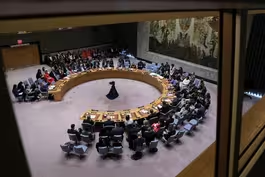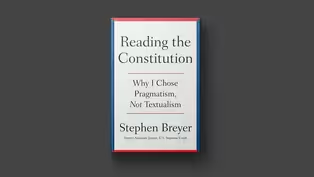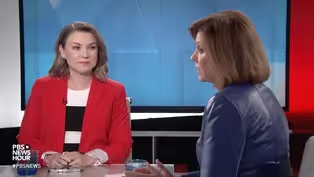
Fate of abortion pill mifepristone goes before Supreme Court
Clip: 3/25/2024 | 7m 48sVideo has Closed Captions
Future of abortion pill mifepristone will be decided by Supreme Court
The U.S. Supreme Court will hear arguments Tuesday over whether to restrict access to mifepristone, one of two drugs used in medication abortions. The case will be the first the court has heard on abortion since it overturned Roe v. Wade. Special Correspondent Sarah Varney reports on what's at stake.
Problems playing video? | Closed Captioning Feedback
Problems playing video? | Closed Captioning Feedback
Major corporate funding for the PBS News Hour is provided by BDO, BNSF, Consumer Cellular, American Cruise Lines, and Raymond James. Funding for the PBS NewsHour Weekend is provided by...

Fate of abortion pill mifepristone goes before Supreme Court
Clip: 3/25/2024 | 7m 48sVideo has Closed Captions
The U.S. Supreme Court will hear arguments Tuesday over whether to restrict access to mifepristone, one of two drugs used in medication abortions. The case will be the first the court has heard on abortion since it overturned Roe v. Wade. Special Correspondent Sarah Varney reports on what's at stake.
Problems playing video? | Closed Captioning Feedback
How to Watch PBS News Hour
PBS News Hour is available to stream on pbs.org and the free PBS App, available on iPhone, Apple TV, Android TV, Android smartphones, Amazon Fire TV, Amazon Fire Tablet, Roku, Samsung Smart TV, and Vizio.
Providing Support for PBS.org
Learn Moreabout PBS online sponsorshipWILLIAM BRANGHAM: The U.S. Supreme Court will hear arguments tomorrow over whether to restrict access to mifepristone, one of two drugs used in medication abortions.
The case will be the first the court has heard on abortion since it overturned Roe v. Wade.
Special correspondent Sarah Varney reports on what's at stake.
SARAH VARNEY: In a doctor's basement in Upstate New York, a makeshift production line is under way.
WOMAN: I have myself, my sister and some friends who help me with doing the packaging.
SARAH VARNEY: To ensure this doctor's safety, "NewsHour" is not showing her face.
She sends medication abortion pills mostly to people living in the 14 states where abortion is illegal.
WOMAN: Texas was the main one.
And in the last few months, we've been seeing more and more in Georgia and Florida.
SARAH VARNEY: This doctor is part of an extensive network of providers that is getting medication out the door quickly.
DR. LINDA PRINE, Aid Access: Hi, this is the hot line doctor.
Can I help you?
SARAH VARNEY: Dr. Linda Prine is part of the same group, and helps patients from her Manhattan apartment.
DR. LINDA PRINE: You can order pills online, and that's what most people from the restricted states are doing.
SARAH VARNEY: She's been prescribing mifepristone since the FDA first approved the drug to end early pregnancy 24 years ago.
What are your observations as a longtime provider about the safety and efficacy of mifepristone?
DR. LINDA PRINE: It's very effective.
I don't even have medications that are 98 percent to 99 percent effective.
Our blood pressure medicines aren't effective like that.
So, it is an unusually effective medication of anything and extremely safe.
SARAH VARNEY: For decades, patients could only get mifepristone at a medical clinic.
But during the COVID pandemic, the FDA eased the rules to allow the drug, like many others, to be prescribed online.
DR. LINDA PRINE: Obviously, you don't need to be handed the pill in the office in order for it to have efficacy.
SARAH VARNEY: When the Supreme Court overturned the constitutional right to an abortion nearly two years ago, Dr. Prine scrambled to find a way for doctors in New York to help patients in states where abortion had been outlawed.
GOV.
KATHY HOCHUL (D-NY): This is how we protect the rights of not just New Yorkers, but all Americans.
SARAH VARNEY: The result of her work was a New York state shield law, passed last year, that protects medical providers who prescribe pills across state lines.
DR. LINDA PRINE: It felt empowering, both for me and for the people who were asking for the pills.
SARAH VARNEY: Five other states have passed similar laws.
How many pills are you mailing a month?
DR. LINDA PRINE: January, I think, was 10,000.
Every month, it's a few thousand more.
SARAH VARNEY: Abortion pills are more widely available now than ever before.
In fact, six out of 10 women end their pregnancies using the medication.
And that's made mifepristone an urgent priority for anti-abortion groups.
The Christian legal advocates who helped overturn Roe v. Wade filed a suit in Texas in November 2022 to ban the medication outright.
An appeals court didn't go that far, but it did order the FDA to reinstate nationwide a number of restrictions, including the requirement that doctors can only prescribe pills in person.
Now that case has reached the Supreme Court.
The anti-abortion group in this case says mifepristone is dangerous, and it cites two studies that claim abortion pills increase E.R.
visits and the risk of hospitalization.
The medical journal that published those studies has since retracted them.
USHMA UPADHYAY, UCSF School of Medicine: The articles made claims that were not supported by the data.
SARAH VARNEY: In this case, these researchers used a trip to the emergency room as a proxy for something has gone wrong.
Is that right?
USHMA UPADHYAY: That's right.
SARAH VARNEY: Ushma Upadhyay, professor of reproductive sciences at the University of California, San Francisco, conducted the largest study to date of telehealth abortions in the U.S. USHMA UPADHYAY: There's no medical reason to overturn or to turn back those regulatory approvals by the FDA.
SARAH VARNEY: Upadhyay says that a small percentage of patients who have medication abortions do visit an emergency room, but mostly to make sure their symptoms are normal.
USHMA UPADHYAY: What's important to know is that a visit to an emergency room is not the same as a serious adverse event.
People go to an emergency room to get care and to ask questions and to get clinical support.
KANIYA HARRIS, Student: Right now, I'm graduating.
SARAH VARNEY: Kaniya Harris is a college senior in Washington, D.C. Last spring, after getting a positive pregnancy test, she took medication abortion pills.
KANIYA HARRIS: I was going through my finals, and I think a lot about how I didn't think I was going to finish college if I had to continue to be pregnant.
People that are like, oh, you should only have an abortion for this reason, this reason, this reason.
I feel like it's very harmful.
SARAH VARNEY: Kaniya says ending her pregnancy at home put her in control of her own health care.
KANIYA HARRIS: At first, I was really anxious if I did it in clinic, because I knew there were a lot of protesters in the D.C. area.
I was able to do it in my apartment, watch my favorite shows, eat the foods I want.
I could just be in the comfort of my own home.
SARAH VARNEY: Legal experts say taking away this option for patients and overriding the FDA would be unprecedented.
RACHEL REBOUCHE, Dean and Peter J. Liacouras Professor of Law, Temple University: You know, at the heart of this case is a real contest about what evidence matters.
SARAH VARNEY: Rachel Rebouche is the dean of Temple University's Law School.
She filed an amicus brief in support of the FDA.
RACHEL REBOUCHE: This case really crystallizes what's always been the politicization of science in the abortion regulation area, but the stakes are getting higher as we have courts strip federal agencies of their ability to make expert decisions.
SARAH VARNEY: The case also contains what scholars say is a bold legal strategy.
Anti-abortion lawyers claim that a long-dormant federal law passed in 1873, the Comstock Act, prohibits the mailing of any supplies used for abortions.
So that could be not just abortion pills, but also hospital beds and medical gloves, anything.
RACHEL REBOUCHE: Anything.
SARAH VARNEY: It would essentially shut down abortion across the United States.
RACHEL REBOUCHE: Because everything is mailed.
SARAH VARNEY: For activists like Kristan Hawkins, that is the aim.
KRISTAN HAWKINS, President, Students for Life of America: You make it illegal for doctors, for abortion vendors, for pharmacies to distribute drugs with the intention to end human life.
That is a direct abortion.
That is what the pro-life movement seeks to stop.
No one is going to be targeting these precincts.
SARAH VARNEY: Hawkins runs Students for Life, one of the largest anti-abortion groups in the country.
KRISTAN HAWKINS: Well, state attorneys general need to go after and prosecute those who are legally mailing abortion drugs into their states.
Then those who are committing those crimes and violating the federal Comstock Act by shipping chemical abortion pills over state lines, there should be consequences for those who are clearly violating state lines.
SARAH VARNEY: But those who support abortion rights say bodily autonomy for women has been a hard-won freedom and this case is a dangerous backslide into the past.
KANIYA HARRIS: I think about like, oh, like hundreds of years ago, they were trying to control our bodies, and they're still trying to control our bodies to this day.
It's really upsetting, because I'm like, well, I should have that choice.
SARAH VARNEY: For now, doctors will continue to head each day to local post offices, filling hundreds of prescriptions from patients across the country.
For the "PBS NewsHour," I'm Sarah Varney in New York.
Families slip into poverty after child tax credit expires
Video has Closed Captions
Clip: 3/25/2024 | 10m 16s | Families slip back into poverty after pandemic-era child tax credit expires (10m 16s)
Rift between U.S., Israel widens over cease-fire resolution
Video has Closed Captions
Clip: 3/25/2024 | 4m 46s | Rift between U.S. and Israel widens over U.N. Gaza cease-fire resolution (4m 46s)
Stephen Breyer on new book 'Reading the Constitution'
Video has Closed Captions
Clip: 3/25/2024 | 10m 30s | Stephen Breyer on new book 'Reading the Constitution' and debate over how to interpret it (10m 30s)
Tamara Keith and Susan Page on Trump's legal issues
Video has Closed Captions
Clip: 3/25/2024 | 6m 58s | Tamara Keith and Susan Page on the political impact of Trump's legal issues (6m 58s)
Trump hush money trial set for April 15
Video has Closed Captions
Clip: 3/25/2024 | 5m 11s | Trump hush money trial set for April 15 as N.Y. court reduces fraud bond (5m 11s)
Providing Support for PBS.org
Learn Moreabout PBS online sponsorship
- News and Public Affairs

FRONTLINE is investigative journalism that questions, explains and changes our world.

- News and Public Affairs

Amanpour and Company features conversations with leaders and decision makers.












Support for PBS provided by:
Major corporate funding for the PBS News Hour is provided by BDO, BNSF, Consumer Cellular, American Cruise Lines, and Raymond James. Funding for the PBS NewsHour Weekend is provided by...




